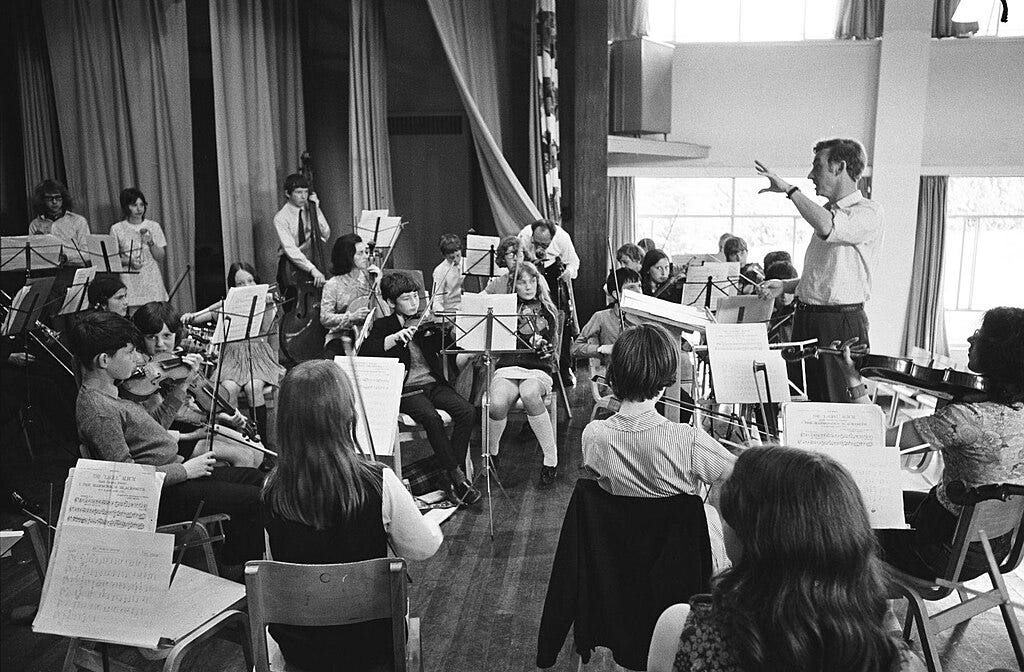Entrepreneur as Orchestra Director
A Tactic from the Owner's Box from KIND Bar founder, Daniel Lubitzky
One of the real joys of this podcast is the opportunity to spend time with great leaders and gifted owners and learn what they have done to guide their organizations. Over the course of the two seasons, this has included Danny Meyer, Ari Weinzweig, Katie Ford, and Cindi Bigalow... just to name a few.
But while I love hearing what they have done, I also like hearing what they notice. It's a bit like taking a chef to dinner at a great restaurant. Sure, I want to taste their meal, but at the same time, I love to see what they pay attention to in the work of others.
So, with that context set, today's short “Tactics from the Owner’s Box” takes us back to another clip from a recent episode—this one with the founder of KIND Bar, Daniel Lubetzky.
Entrepreneur as Conductor
As we neared the end of our conversation, Daniel and I got into a tangent about why some companies can maintain their culture as leadership changes while others still fade away. One theory on this, popular in books like The Founders Mentality, is that continuity in transition is driven by the “DNA” of the person navigating the ship.
But you can also imagine a leader getting in the way of that organization’s flourishing. One reason for the “challenge of the Founder DNA” is tied to how we learn from success. Too often, when something works, we engrain this past strategy into a static view of what will work moving forward. But, as has always been the case and is increasingly so today given the uncertainty in our market, what worked in the past does not always translate to what will work moving forward.
In this way, sometimes, the founder's role is to step back and allow something other than that DNA to shape the organization's direction.
Here is Daniel:
One of the interesting things about the journey of an organization is that at some point if the entrepreneur is not a good orchestra director, they can really get in the way. As the organization grows, a good leader needs to empower all of the team members and thus create an ensemble movie or orchestra for it to perform beautifully.
In other words, the CEO or founder needs to change their roles from driving everything to instead empowering their team and creating the environment for their team leaders to excel. It's not easy for an entrepreneur to do that, but they can stifle their team if they don't create the space for them to grow.
(This doesn’t mean, however, that the entrepreneur needs to leave.) Often, the ideal scenario is where the entrepreneur sticks around. If you are a successor to the entrepreneur who doesn't respect the founder and the entrepreneur and says, “Oh, this person is just getting in the way,” you're gonna deprive the organization of that creativity and that energy that an entrepreneur brings to the table.
But, on the other hand, if you let the entrepreneurs just do whatever they want, they could kill the organization by keeping it in disarray.
So you need to find a partner, like Tim Cook was to Steve Jobs, who celebrates entrepreneurial excellence, helps keep all of that entrepreneurial talent around, and was a great orchestra director. And that's where greatness comes sometimes. It's not from you being the only protagonist; it's from you elevating your team.
So, how does one do that? How does a leader suppress one’s ego enough to know when to step back into a new role? How does one learn to trust one's team or successor to do things one might have done well in the past but is not prepared to do moving forward?
Confronting the Existential Moment
In my view, one path toward progress is emotional—even existential.
In his canonical text, Existential Psychotherapy, Irvin Yalom introduces the four existential horsemen that underlie much of human anxiety—and, as Yalom suggests, much of our suffering. These are the fear of death, the fear of freedom, the fear of isolation, and the fear of meaninglessness.
When stepping back from leadership, a leader inevitably confronts death and meaninglessness. After all, if this organization could exist without me, does it need me at all? If not, what does that imply about my own meaning of life?
Too often, an unhealthy leader holds on more strongly when facing this situation. They tighten their grip. They fail to move to the conductor’s seat and must remain the first violin soloist.
But, as Daniel reflects, to be a healthy leader means to step back and let other voices or instruments rise to the top.
Three Tips for Moving to the Conductor Role
This path toward existential maturity takes time — if we reach it at all. But as we work to build this posture, there are some small steps that move us in the right direction.
How about these three as a start?
First, if you are a leader, try being the last person to speak in the room. A good friend once told me that the last time they heard the truth was when they got promoted to the CEO. Take that as an insight into the narrowing of dialogue you have by being the first to chime in.
Second, spend time building a rich awareness of the skills of your orchestra, and learn how to encourage their development. After all, you can't be a good conductor until you know the capability of the players.
Finally, try to see your true superpower as moving from a big personality to a resilient system. It can feel scary to distill your DNA as a leader into a system -- but without doing so, it is all the more likely to fade away as you step back into this new role.
As always, thanks for listening and reading. Thanks to Austin Alred and Jennifer Wintzer for their work supporting this show and Emilia de Jounge for wading back through Daniel's episode to pull out gems like this one.
We look forward to seeing you in a few weeks with a new full episode on the experimentation with employee ownership into private equity deals supported by Ownership Works.
Three Insights on Ownership in the News
Given the recent discussion of private equity in sports, including the recent purchase of the Boston Celtics, it was fun to revisit this New Yorker story that explores a player ownership model in women’s sports being championed by Athletes Unlimited.
For those who find themselves missing HBO’s hit show Succession, I recommend James Murdoch's page-turner at The Atlantic chronicling the fascinating feud behind the Murdoch family succession.
Given the focus of this newsletter on ownership and, sometimes by extension, entrepreneurship, I want to share a gem I stumbled upon in the most recent Recomendo newsletter (highly recommended follow). In the most recent send, Kevin Kelley, one of the email’s curators, references Kickstarter as a creative way to think about funding — one where the backers get their money back if the concept doesn’t get full funding. But, with that as a tease, he then links to a site that captures 64 (!!) unique ways of approaching funding a novel idea — a few visualized below. For those of us who too narrowly think about the start of an organization or initiative, it’s a super thought-provoking site!
See you in a few weeks for an interview with Anna-Lisa Miller, whom you can read about here.






